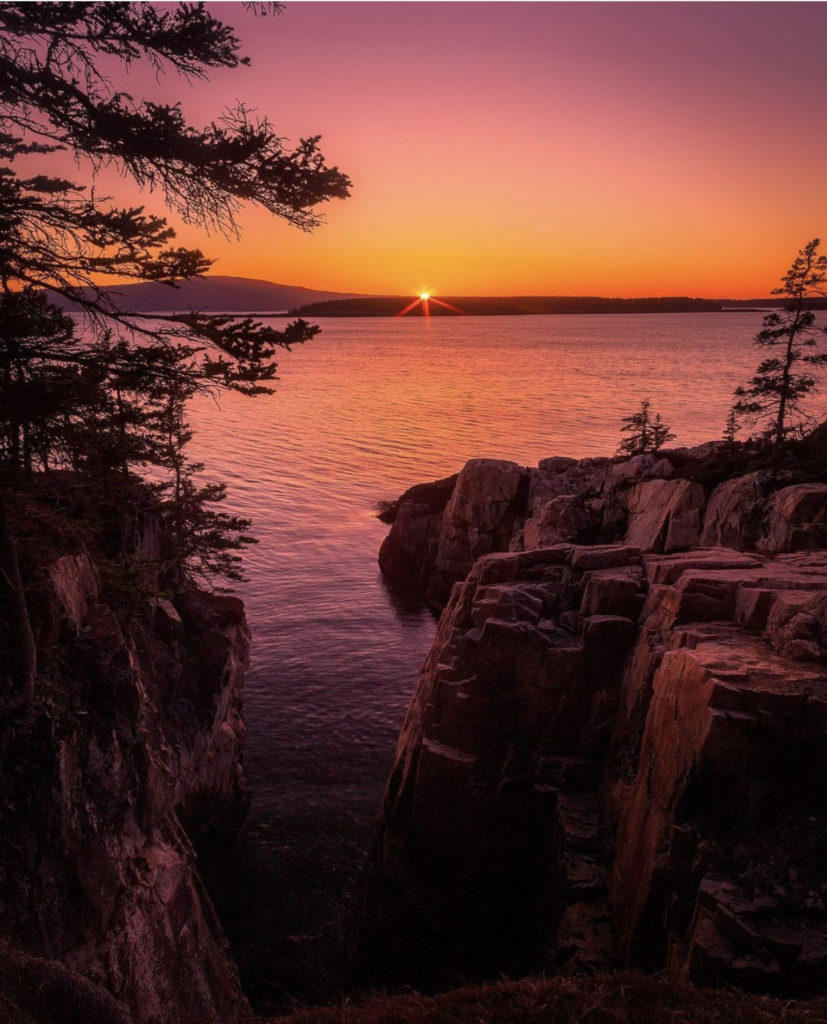
Photo Credit @Colin_McGahan “Last Light”
(this is what Kevin Schneider, superintendent at ANP, would have said, had he been called on at the scoping session)
FINAL COMMENTS – June 23, 2021 American Aquafarms, Inc.- Aquaculture Lease Scoping SessionAgency: Maine Department of Marine Resources Date: June 23, 2021Time: 4:30 p.m.Location: Remote meeting held via Zoom
Good afternoon.
I am Kevin Schneider, superintendent at Acadia National Park and am here today to speak on behalf of the National Park Service. We appreciate the opportunity to offer comments on the two proposed AmericanAquafarm lease applications in Frenchman Bay.American Aquafarms is proposing to develop a 120-acre industrialized salmon fish hatchery on Frenchman Bay located just 2,000 feet from Acadia National Park at its closest point. While many other commercial fishing and aquaculture activities take place within Frenchman Bay, and exist in harmony with Acadia National Park, this development is totally different thanexisting aquaculture activities near the park. The scale of this development—the equivalent of 16 football fields—is unprecedented in Maine and incongruous with the existing nature and setting of Frenchman Bay and its surrounding lands. Acadia National Park was established in 1916 to protect the outstanding scenic qualities, and natural and cultural resources of an area that stretches 50 miles across the coast of Maine from Schoodic Point to the Penobscot Shipping Channel. Acadia was the first national park established in the eastern United States and today is one of America’s most iconic national parks and is the kind of place with the power to transform lives. Much of the reason that Acadia is so unique on the East Coast of the United States is thatit exists largely within a relatively pastoral, undeveloped landscape. Park lands include more than 38,000 acres in fee owned lands and 12,500 acres in conservation easements that cover much of Mount Desert Island, Isle au Haut, Schoodic Peninsula, and more than 100 islands. These lands provide millions of visitors with the opportunity to experience and be inspiredby the exceptional qualities of the park’s nationally significant resources. Visitors come from around the world to hike, bike, paddle, and enjoy the magnificent scenery in and around Acadia National Park. In 2019, visitors to Acadia contributed $511 million to the regional economy and supported nearly 5,500 jobs in communities within 60 miles of the park. As the primary tourist destination in Maine, Acadia plays a key role in the state’s tourism economy. In 2019, tourists to Maine spent nearly $6.5 billion dollars, which supported more than 116,000 jobs—about 17% of employment—making it one of the state’s largest industries. And the park is not just a magnet for tourism. It is also why so many have retired here, moved their business, or just chosen to call this place home – the opportunity to recreate in this inspiring place just a short drive from home is priceless. Living with a national park in your backyard, and the amenity values it provides, significantly improves the quality of life for area residents. And so it is within this context that we are here today, speaking for this national park that has endured for 105 years, and will endure for another 105. Our Management Policies direct us to monitor proposed changes outside to the park for their potential impacts on park resources and values, and to engage constructively with the broader community in the same way that any neighbor would. We continually encourage compatible adjacent landuses and seek to avoid and mitigate potential adverse impacts on park resources and values by actively participating in the planning and regulatory processes of other federal, tribal, state, and local governments having jurisdiction over the proposed use or development. Cooperative conservation beyond park boundaries is necessary for the NPS to fulfill its mandate to preserve national parks unimpaired for future generations. Our natural resources cross park boundaries, and many of the scenic vistas enjoyed by Acadia’s visitors include lands not owned by the National Park Service. Therefore, we know activities proposed for adjacent lands and waters may significantly affect park resources and values. The NPS has identified a range of potentially significant impacts to the park’s resources and values, including the experience of our visitors. While we are continuing to review and evaluate the information we have so far, our written comments will identify information needed to adequately assess impacts to the park’s scenic and historic resources, dark night sky, natural soundscape, intertidal zone, wildlife, and air and water quality.We intend to provide more detailed written comments in response to the scoping session. Given the scale and complexity of the proposal, we request that the DMR extend the deadline for submitting written comments by 30 days from July 7 to August 6. We sincerely appreciate the opportunity to comment on this proposal.